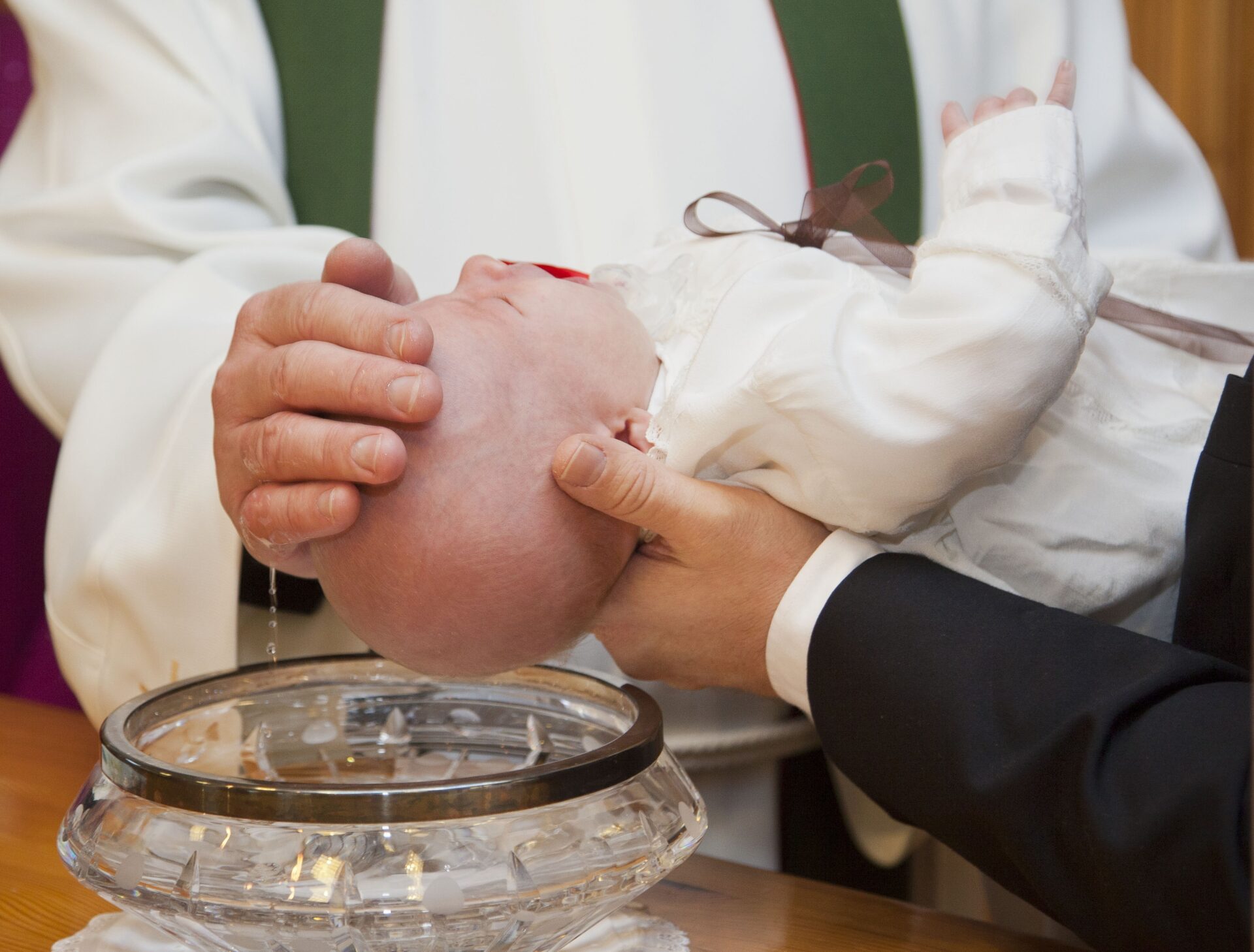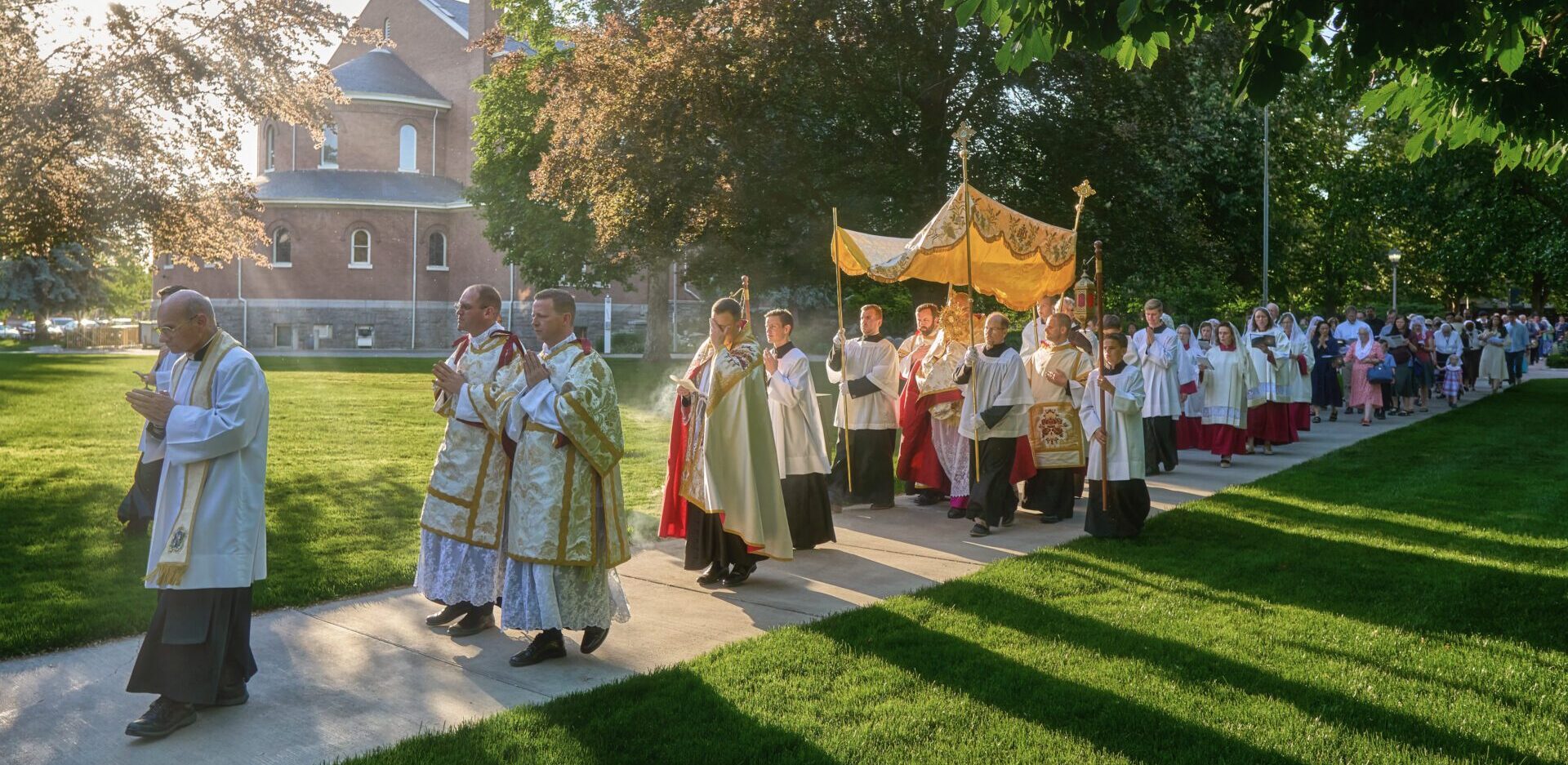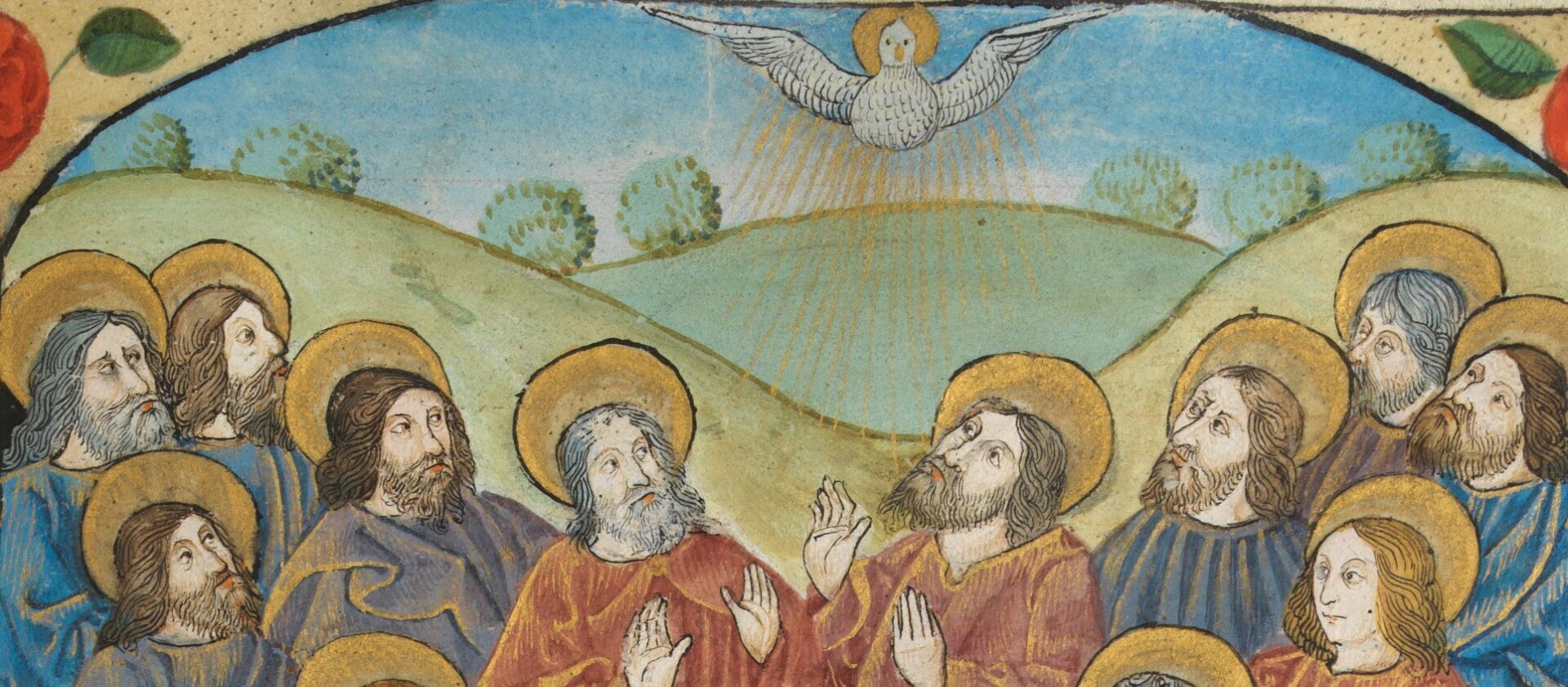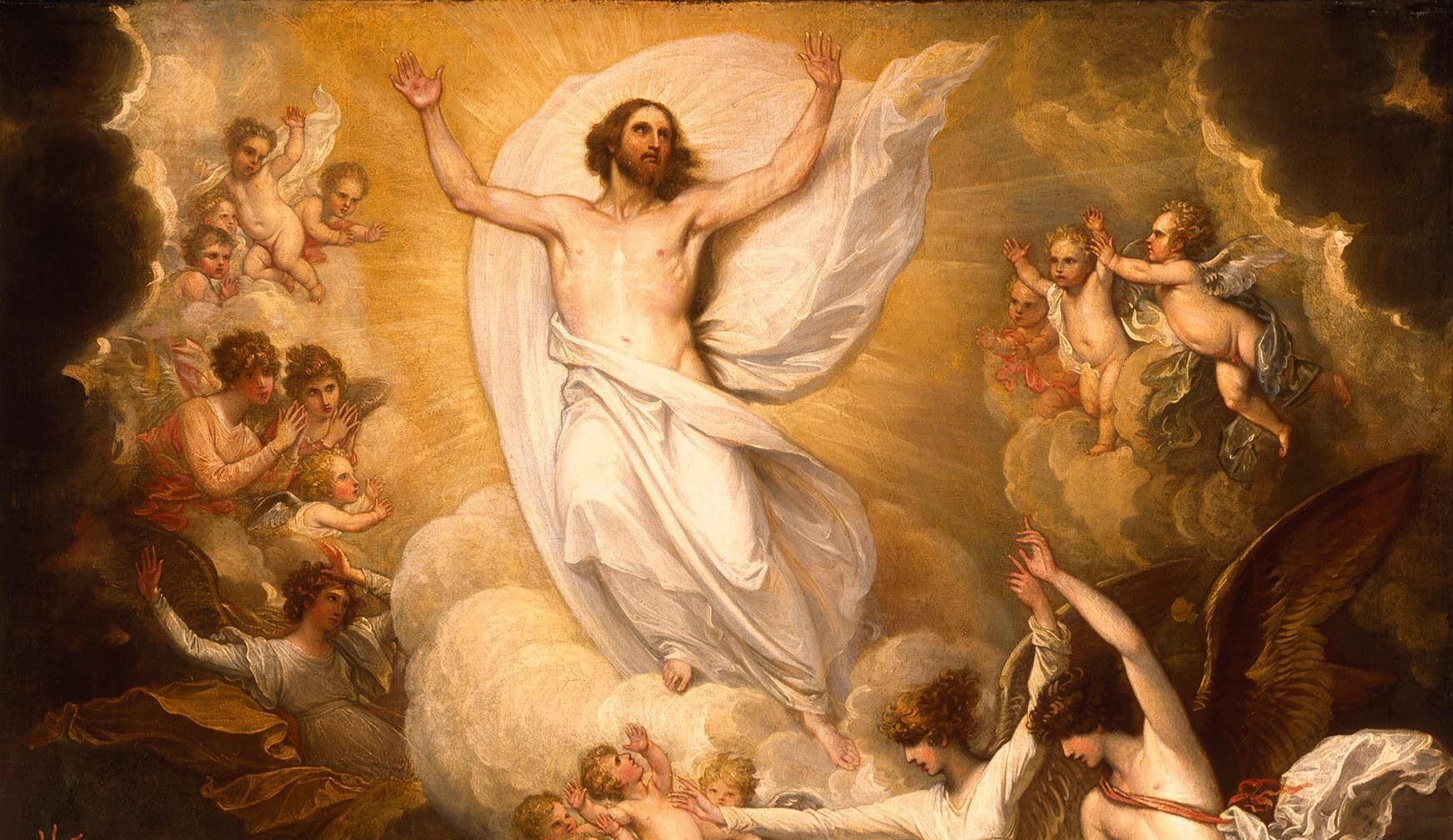In last month’s exploration of how the liturgy of the Church is the greatest and surest source of instruction in spiritual childhood, we looked at the role of the liturgy in the life of the each Christian. This was a necessary foundation for considering how liturgical worship transcends a purely sociological, communal activity. The liturgy’s corporate nature does not detract from the individual benefits it confers on each soul. This month, we come, at last, to the very heart of the question: how the liturgy of the Church is our source of adoption as children of God. We are adopted primarily by Baptism and the other sacraments. Upon this foundation (and to be taken up in the next installment), we’ll discover how our soul’s new divine life is cultivated primarily by the liturgical ceremonies of the Church—and this is an authentic, Catholic psychology.
The ultimate meaning of spiritual childhood can be summarized thus: participation in the life of Christ. Aquinas teaches that the only distinction between the Persons of the Trinity, who are the One and the same God, is their relation to one another: “The Father is denominated [named] only from paternity; and the Son only from filiation”1. Relation, in contrast to inherent properties, “in its own proper meaning signifies only what refers to another.”2 In some circumstances, the relations are a purely logical relation. Yet, “when something proceeds from a principle of the same nature, then both the one proceeding and the source of procession, agree in the same order; and then they have real relations to each other. Therefore, as the divine processions are in the identity of the same nature, these relations, according to the divine processions, are necessarily real relations”3
Continuing along the teaching of Aquinas, the only distinguishing characteristic between the Divine Persons is their relation to one another.4 The relations that exist within the Trinity are so real and profound that, although there is only One, Simple God, the relations that exist in virtue of the eternal processions necessitate distinct Persons: “Boethius says (De Trin.) that every word that refers to the persons signifies relation. But no word belongs to person more strictly than the very word person itself. Therefore, this word person signifies relation.”5 Consequently, that which makes the Second Person of the Trinity distinct from the Father or the Holy Spirit is his Sonship. He is eternally the Son of God. His very Personhood is a consequence of his Eternal Sonship. Dom Columba Marmion summarizes it thus: “God is a Father. Eternally, long before the created light rose upon the world, God begets a Son to Whom He communicates His Nature, His perfections, His beatitude, His life, for to beget is to communicate being and life…. In God then, is life, life communicated by the Father, and received by the Son.”6 For men to become children of God, therefore, it is necessary to be initiated into the Sonship of Christ.
Adoption in Christ is one of the most ancient doctrines of the Church and is explicitly taught in the New Testament. Christ teaches his disciples that they must become children. Paul and John further explain how to become children and what it entails. When the disciples besought the Lord, “teach us how to pray,” he immediately taught them to call upon God in the most intimate manner: “Our Father, who art in heaven…” (Matthew 6:9; Luke 11:2). One can only call God Father, however, if one is truly a child of God. Christ undoubtedly instructed his disciples about the necessity of becoming children. When he told Nicodemus “Truly, truly, I say to you, unless one is born anew, he cannot see the kingdom of God” (John 3:3), no other conclusion can be drawn than that one must become a child in order to see the kingdom of God. Adults cannot be born—only children. This is not an ordinary birth, however, but a supernatural one—a birth by “water and Spirit” (John 3:5).
This birth is the source of all sanctification. As was shown above, God’s primary will for souls is holiness, and holiness “is a mystery of Divine life communicated and received: communicated in God, from the Father to the Son by in ineffable generation.”7 If the Son is eternally receiving life from the Father, and the reception of life is that in which holiness consists, then one must conclude that “All holiness is to consist in this: to receive the Divine life from Christ and by Christ, Who possesses its fulness and Who has been constituted the One Mediator; to keep this Divine life and increase it unceasingly by an ever more perfect adhesion, an ever closer union with Him who is its source…so that Christ is truly the life of the soul because He is the source and giver of life.”8
The Sacrament of Baptism is the new, spiritual birth for souls. St. Paul says “Do you not know that all of us who have been baptized into Christ Jesus were baptized into his death? We were buried therefore with him by baptism into death, so that as Christ was raised from the dead by the glory of the Father, we too might walk in newness of life. For if we have been united with him in a death like his, we shall certainly be united with him in a resurrection like his” (Romans 6:3-5). Christ, although having no sin in himself, subjected himself to God’s will in perfect obedience—even until death (see Philippians 2:8). His perfect obedience served both as the perfect satisfaction for the disobedience of Adam and Eve and the accomplishment of the punishment which God assigned to their disobedience—“you may freely eat of every tree of the garden; but of the tree of the knowledge of good and evil you shall not eat, for in the day that you eat of it you shall die” (Genesis 2:16-17).
Certainly, physical suffering and death are one dimension of the punishment meted out to Adam and Eve, but they are not the harshest portion of the penalty. The ultimate penalty is separation from God, loss of sanctifying grace, eternal death. Yet, God’s infinite mercy stayed off this punishment until the opportune moment: “but when the time had fully, God sent forth his Son, born of woman, born under the law, to redeem those who were under the law, so that we might receive adoption as sons” (Galatians 4:4-5). Baptism, therefore, has become the means by which souls may satisfy the debt of death that each owes. Baptism unites the soul to Christ. Through Baptism, the death of Christ is applied to the soul and the debt is considered paid. Paul continues in the above passage by concluding “because you are sons, God has sent the Spirit of His Son into our hearts, crying, ‘Abba! Father!’ So, through God you are no longer a slave but a son, and if a son then an heir” (Galatians 6:7).
Thus, Our Lord conclusively affirmed that “he that believes and is baptized shall be saved” (Mark 16:16). It is indisputable among Catholic theologians that “baptism is the first in date of all the sacraments; Divine life is first infused into us at Baptism. All divine and supernatural communications converge towards this Sacrament or normally pre-suppose it: thence its value.”9 Although Baptism alone is absolutely necessary for salvation, as was stated above, the rest of the sacraments are necessary in a more fitting sense, for they remedy the sins that men commit. The primary effect of the sacraments is grace, and Aquinas reiterates that “grace, considered in itself, perfects the essence of the soul, in so far as it is a certain participated likeness of the Divine Nature” which is nothing other than participation in the Sonship of Christ.10 He then explains further how the sacraments cultivate the Divine life in the soul beyond the first initiation: “Now the sacraments are ordained unto certain special effects which are necessary in the Christian life: thus Baptism is ordained unto a certain spiritual regeneration, by which man dies to vice and becomes a member of Christ: which effect is something special in addition to the actions of the soul’s powers: and the same holds true of the other sacraments. Consequently, just as the virtues and gifts confer, in addition to grace commonly so called, a certain special perfection ordained to the powers’ proper actions, so does sacramental grace confer, over and above grace commonly so called, and in addition to the virtues and gifts, a certain Divine assistance in obtaining the end of the sacrament. It is thus that sacramental grace confers something in addition to the grace of the virtues and gifts.”11
The added grace, virtues, and gifts are ordered to perfecting the divine life that was received in Baptism. This is why St. Paul exhorts the Ephesians to “put off the old man which belongs to your former manner of life and is corrupt through deceitful lusts, and be renewed in the spirit of your minds, and put on the new man, created after the likeness of God in true righteousness and holiness” (Ephesians 4:22-24). Since we were Baptized into the death of Christ, all Christians are able to exclaim with Paul that “I have been crucified with Christ; it is no longer I who live, but Christ who lives in me” (Galatians 2:20). The reality of Christ living in each Christian demands that “whether you eat or drink, or whatever you do, do all to the glory of God” (1 Corinthians 10:31).
The liturgy of the Church is both the source of adoption as children of God as well as the means by which the faithful develop in a childlike spirit. The former is achieved primarily by Baptism and the other sacraments, as we have seen above. The latter is achieved primarily by the ceremonies of the Church, and it is to these ceremonies that we’ll turn our attention next time.
For previous instalments of Steven Hill’s Spiritual Childhood from Liturgical Worship series, see:
- Part I: Introduction
- Part II: Monasticism and Christian Spirituality
- Part III: The Liturgy: The Prayer of the Church
Stephen Hill is an MTS student in Liturgical Studies at the University of Notre Dame. Prior to this program, he completed a BS in psychology and an MA in systematic theology. All of his research was inspired by several years of Benedictine formation, and the monastic tradition continues to influence his work. Hill strives to explore the intersection of contemporary psychological research and patristic psychological writings where both fields are most fully manifested: in the sacred liturgy.
Image Source: AB/Pexels
Footnotes
- ST, I, q. 28, a. 1.
- ST, I. q. 28, a. 1.
- ST, I, q. 28, a. 1.
- ST, I, q. 28, a. 3: “The attributing of anything to another involves the attribution likewise of whatever is contained in it. So, when man is attributed to anyone, a rational nature is likewise attributed to him. The idea of relation, however, necessarily means regard of one to another, according as one is relatively opposed to another. So as in God there is a real relation, there must also be a real opposition. The very nature of relative opposition includes distinction. Hence, there must be real distinction in God, not, indeed, according to that which is absolute—namely, essence, wherein there is supreme unity and simplicity—but to that which is relative.”
- ST, I, q. 29, a. 4.
- Columba Marmion, Christ the Life of the Soul, trans.by a nun of Tyburn Convent (St. Louis: B. Herder Book Co., 1922), 5-6.
- Marmion, 7.
- Marmion, 7.
- Marmion, (153).
- ST, III, q. 62, a. 2.
- ST, q. 62, a. 2.



